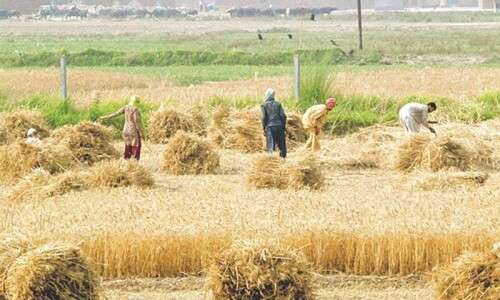Introduction: The Growing Tensions in Pakistan’s Agriculture Sector
Pakistan’s agriculture sector, the backbone of the country’s economy, has been facing increasing pressure from various challenges over the years. Farmers, who play a critical role in sustaining the economy, are now raising their voices against what they see as rising costs, lack of support from the government, and exploitation by industries, which are slowly driving them into financial turmoil. Kissan Ittehad, one of the largest farmer organizations in the country, has warned of a massive protest march on Islamabad unless their demands regarding wheat support prices and reductions in input costs are met.
This article delves into the issues raised by the Kissan Ittehad, the government’s stance on agriculture support prices, the looming crisis in the farming sector, and what this could mean for Pakistan’s agricultural future.
The Call for Action: Kissan Ittehad’s Ultimatum
Khalid Hussain, the Central Chairman of Kissan Ittehad, expressed deep concern over the rising costs and insufficient support provided by the government to the farmers. During a recent news conference, he outlined the farmer organization’s grievances, warning that the government would soon face a nationwide protest if their demands are ignored.
Farmers, already struggling with various challenges, have grown increasingly frustrated with the rising prices of agricultural inputs and the lack of fixed support prices for crops like wheat and sugarcane. In this context, Kissan Ittehad has demanded:
- Increase in Wheat Support Price: The farmers are calling for an increase in the wheat support price to Rs 5,000 per 40 kilograms.
- Increase in Sugarcane Support Price: The demand is also made for the price of sugarcane to be fixed at Rs 400 per 40 kilograms, a price that they feel would compensate for the increasing costs of production and the exploitation by mills.
Hussain stated that if these demands were not met in the coming weeks, farmers from all over the country would march to Islamabad to stage a sit-in. This would send a powerful message to the government, urging them to address the agricultural sector’s worsening conditions.
The Struggles Faced by Farmers in 2024
The year 2024 is shaping up to be a disastrous one for Pakistan’s agriculture. Farmers have faced numerous challenges, which have only worsened over time. Key concerns include:
- Increased Input Costs: The costs of essential agricultural inputs such as fertilizers, seeds, and irrigation water have escalated, putting an additional strain on the already struggling farmers. The Punjab government has not fixed the rates for key agricultural inputs, making it even harder for farmers to manage their operations.
- Increased Electricity Bills for Tube Wells: Farmers who rely on tube wells for irrigation are now burdened by electricity bills that have surged beyond manageable limits. Reports indicate that electricity charges for running tube wells have increased substantially, leading to financial distress for farmers who already struggle with poor crop yields and unmanageable debts.
- Water Irrigation Charges: Water is a vital resource for agriculture, especially in water-scarce regions. However, in a move that has shocked the farming community, irrigation water rates in Punjab have jumped dramatically, from Rs 300 to Rs 5,000 per hour. This drastic hike in charges has left farmers with limited access to affordable irrigation, putting their crops at risk.
- Lack of Subsidies: Unlike other sectors, the agricultural industry in Pakistan is not receiving the same level of subsidies as it did in previous years. This lack of government support is making it difficult for farmers to cope with the increasing costs of production and the unstable market conditions.
- Exploitation by Mills: The government has failed to fix the minimum rates of sugarcane and wheat, leading to a situation where mills are taking advantage of farmers. The Pakistan Sugar Mills Association had previously announced that they would buy sugarcane at Rs 400 per maund, but farmers have reported that mills are offering only Rs 300 to Rs 325 per maund, thus cutting into their profits.
The Government’s Response and IMF Agreements
While the Kissan Ittehad has been vocal in its criticism of the government, it’s essential to consider the government’s position in this matter. Pakistan’s agreement with the International Monetary Fund (IMF), which mandates an end to subsidies and the promotion of a free-market economy, has significantly impacted the agricultural sector. The government has refrained from fixing minimum support prices for crops, arguing that such decisions should be left to market forces.
This stance aligns with the IMF’s vision of reducing state intervention in the agricultural sector, aiming to shift towards a more competitive market-based system. However, critics argue that this policy is detrimental to the welfare of farmers, especially when they are facing exploitation at the hands of powerful industries and mills.
The Economic Impact of the Crisis in Agriculture
The ongoing crisis in agriculture is having significant consequences for Pakistan’s broader economy. As the country’s primary sector, agriculture employs a large portion of the population, and its stability is crucial for maintaining food security and reducing poverty levels.
- Impact on Food Prices: The rising cost of agricultural inputs is likely to push food prices higher, making basic food items less affordable for the average Pakistani. This could exacerbate inflation and contribute to food insecurity, especially for low-income households.
- Economic Strain: The agricultural sector’s struggles are also impacting other parts of the economy, including the processing industry, transport sector, and rural economies. With farmers unable to produce at full capacity due to increased costs and poor returns, the entire supply chain suffers.
- Impact on Rural Livelihoods: The vast majority of farmers in Pakistan are smallholders who live in rural areas and rely on their farms for their livelihoods. The worsening conditions in agriculture are threatening their very survival, leading to increased rural poverty and migration to cities in search of better opportunities.
Solutions and the Path Forward
To resolve the ongoing crisis, a multi-pronged approach is required that addresses both short-term needs and long-term sustainability:
- Government Support and Subsidies: The government should consider reintroducing subsidies for essential inputs such as fertilizers, seeds, and irrigation water. These subsidies would help reduce the burden on farmers and make agriculture more viable.
- Fair Minimum Support Prices: The government must fix fair minimum support prices for crops like wheat and sugarcane to ensure that farmers are compensated adequately for their hard work and investment.
- Addressing Exploitation by Mills: The government should take a more active role in regulating the sugar and wheat mills to prevent them from exploiting farmers by paying below-market rates for crops.
- Water Management: Pakistan is facing a water crisis, and it is essential to implement efficient water management strategies to ensure that farmers have access to affordable and sustainable irrigation resources.
Conclusion: A Call for Immediate Action
The situation in Pakistan’s agriculture sector is rapidly deteriorating, and the Kissan Ittehad’s call for a protest march on Islamabad is a clear signal that farmers are reaching their breaking point. The government needs to listen to their concerns and take swift action to address the rising input costs, unfair exploitation by industries, and lack of support for agricultural production.
If the farmers’ demands are not met, Pakistan could face a widespread agricultural crisis that will affect not only food prices but also the economic stability of the entire nation. The government must act now to protect the livelihoods of farmers and ensure the future of Pakistan’s agricultural sector.
FAQs:
1. Why is the Kissan Ittehad threatening a protest march? The Kissan Ittehad is threatening a protest march to Islamabad if the government does not address their demands, including increasing the wheat support price to Rs 5,000 per 40 kg and the sugarcane price to Rs 400 per 40 kg.
2. What are the key challenges faced by farmers in Pakistan? Farmers are facing challenges such as increasing input costs, high electricity bills for irrigation, increased water charges, lack of subsidies, and exploitation by mills offering below-market rates for crops.
3. How has the IMF agreement affected the agricultural sector? The IMF agreement has led to the removal of subsidies and the promotion of a free-market economy, which has worsened the financial conditions for farmers, who rely on government support to cope with rising production costs.
4. What impact is the agricultural crisis having on the economy? The agricultural crisis is contributing to rising food prices, economic strain, and increased rural poverty, which in turn is affecting the broader economy, including related industries such as transportation and processing.
5. What solutions are being proposed to resolve the crisis? Solutions include government subsidies for agricultural inputs, fair minimum support prices for crops, regulation of mills to prevent exploitation, and better water management strategies to ensure sustainable irrigation.



